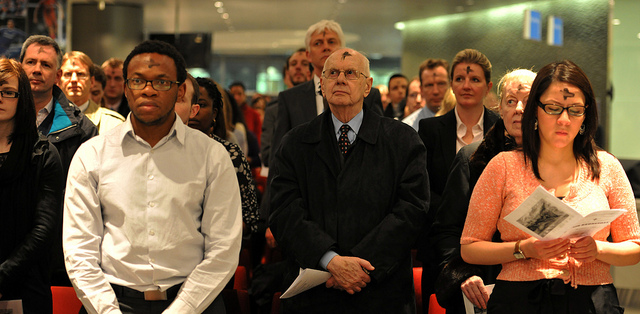This is a guest post by Dr. Maureen Day, Assistant Professor of Pastoral Theology at the Franciscan School of Theology in Oceanside, California. Dr. Day is a graduate of the Graduate Theological Union and teaches courses in moral theology and pastoral ministry at the Franciscan School of Theology. Her research focuses on American Catholic civic engagement. She can be reached by email at maureenday@fst.edu.

As I was interviewing Jack Jezreel, the founder of JustFaith Ministries, he recalled the conversion experiences Catholics had when they were first exposed to Catholic Social Thought (CST) at Church of the Epiphany in Louisville, Kentucky. JustFaith Ministries now offers their small-group curricula to parishes nationwide and over 50,000 people have gone through their various programs. In 1989, when the first dozen or so participants got to know one another, reflected on readings together, prayed together and heard stories from people on the social margins, they came to realize that the world is not quite what they had thought it was. Some of them had less dramatic transformations, describing it as an intensification of their already present commitment to CST. Others had a complete turn-around, switching careers and selling their homes in an effort to downsize. I found his memories of these first participants echoed in the participants of the present as I interviewed roughly sixty JustFaith graduates – JustFaith is the original 24-week program – in Kentucky and California. I also saw the actual process firsthand through my participant observation in four JustFaith Ministries programs (JustFaith, Engaging Spirituality, a JustMatters module on prison reform and GoodNewsPeople). I realized after my two years of research that adults come to or change their moral values and other positions through two main sources: experience and community. This may not come as a shock if you are familiar with literature from the sociology of conversion or even if you simply saw a sudden change in a friend or family member. But it is worth exploring these two in detail, especially for those interested in the actual process of helping adults to look at the world through the Catholic imagination.
Jezreel told me a story during our interview about two types of Native American homes (I admit I was unable find the public radio show he pulled from here, but I was able to find some evidence in anthropological literature that confirmed elements of this story). To summarize, he said that some tribes in the region built three-poled tipis and others built four-poled tipis. However, the three-poled tipis were superior in every way: They required less material, they were easier to take down and put up, they were more sturdy in the wind and so forth. The raises the question as to why some tribes would continue to use the four-poled design. According to Jezreel, the radio guest answered simply that their parents did it that way. The lesson is that it is not facts that shape people’s opinions; previous experience wins the day. Jezreel expands this:
For example, if people hang out in an environment in which everybody thinks poor people are lazy, then no matter what data you put in front of people, there will be the inclination for these people to believe that poor people are lazy. Their environment kept repeating it and repeating it and repeating it until it became part of their loyalty. And your loyalty will actually trump hard and fast facts.
Although it is true that our opinions and worldviews run deep, people can change these very drastically if they have 1) experiences that show them a different way of understanding reality and 2) a community to reinforce their new understandings. Part of JustFaith’s success is due to their two-fold approach of both providing the participants opportunities to meet people experiencing poverty or vulnerability and creating an intentional, affective community of faith.
Experience
JustFaith illustrates that experience is critical in teaching adults CST. Several participants in JustFaith became more sensitive to those in situations of poverty, as this retired, Southern California JustFaith participant demonstrates:
[Before JustFaith] I would see homeless people and [think], “Oh gees, if they wanted a job they could have a job. They’re just lazy!”… And then after going down and feeding the hungry and getting exposure to a lot of these types of people that are just really victims maybe of just wrong place at the wrong time or illness or abuse and realize there are a lot of other stories that are out there, too. So [JustFaith] softened me.
This man came out of a worldview that understood poverty as an individual-level problem, maintaining that with enough hard work, anyone can pull themselves out of poverty. However, as he got to know actual people in poverty, these experiences called into question his previous wisdom and he realized the ways structural conditions can hinder people’s personal agency.
Community
Community is the other critical component to changing one’s outlook. Previous research has shown that these worldview-transforming experiences can only be sustained through the support of respected others (Christian Smith’s Resisting Reagan illustrates this well). JustFaith does not begin with CST, but initially simply invites the participants to get to know one another. Only after these participants share deeply personal stories over the course of the two-day retreat do they begin to explore more contentious issues. By establishing the JustFaith community as a reference group – that is, as people you see yourself as a moral part of – shared moral understanding becomes easier and dialogue more open, as one Northern California participant claims:
And so I think that kind of [intimate] space, which is both prayerful and personal, starts to set up a journey-type of thing which then allows for the discussion of other things. Not to say that those discussions weren’t difficult later on. Because I do think they were [laughs]. When you have a disagreement with someone on any topic, it’s very easy to demonize the other person because you don’t know them, so you can put them in a box, you can say they are this or that, and you can judge them. But if you respect someone and then they disagree with you, that causes you to re-evaluate and that is a harder thing to do.
These communities cause people to consider CST in ways they had not before as they begin with care, allowing people to hear opposing views from people they respect and cannot, without serious affective dissonance, demonize. JustFaith communities generally come to moral consensus on a variety of issues and they act as support mechanisms for the participants as they engage a world they deem agnostic of or opposing the Gospel.
Implications for Faith Formation in Parish Contexts
Although I have applied experience and community to CST through observations in JustFaith Ministries, these ideas can be used by parishes and educators to bridge the ideological divides in their houses of worship and classrooms (see, for example, Konieczny, Camosy, and Bruce’s Polarization in the US Catholic Church for cultural divides in the parish context). Creating spaces of respect and dialogue is very conducive to storytelling. Also, hearing experiences from outside of the core group is likewise effective! When people hear the victim and perpetrator of a crime discuss how restorative justice was able to help them, hear the desperation that motivated undocumented immigration or hear the dangers of those in situations of domestic violence, they have a new way of understanding evil. As they process these stories as a group through the lens of a common faith these become salient to people even when they have never experienced any serious crime, migration or violence themselves. And, importantly, people help each other work through solutions in these groups. The good news for those concerned that bringing CST to a few will only exacerbate a parish’s political divide is that my research shows otherwise. When a critical mass of JustFaith participants are present in a parish – about three dozen, roughly three runs of the program – the parish culture changes. More outreach ministries are created and non-JustFaith participants get involved in the winter shelter, Bread for the World letter drives and others. Ultimately, poverty becomes a concern that coheres the parish rather than divides, especially when it is supported by the parish priest.
A final thought in implementing experience and community for your own setting: People are often less than grateful to have a priest, professor, politician or pew-mate tell them what to believe (see Richard Gula’s Just Ministry for responsible preaching and consider the ways it might apply to other contexts). The above indicates that we should, instead, create opportunities for others to hear the stories of people living in realities that are distant from their own and allow them to process this new information within a thoughtful, trusted and intimate community. My teaching context at a Franciscan seminary (my own community and experiences showing now) reminds me that the Incarnation was a historical moment that connects us to God in an ongoing reality. This theological truth gives me great hope in humanity, both at the collective and individual level. Knowing that we have been made with a capacity for great holiness should inspire us not to spoon-feed information to others, but to provide encounters and to facilitate deep reflection on these new experiences. This can help us to finally understand the social worlds of others and to (deep, not cheap) reconciliation and healing of our personal and social wounds as we promote the common good with hearts opened by CST.




